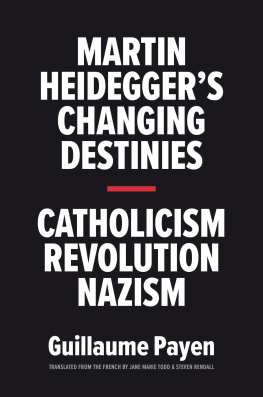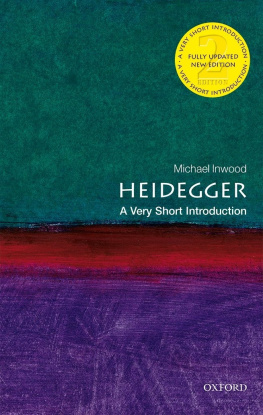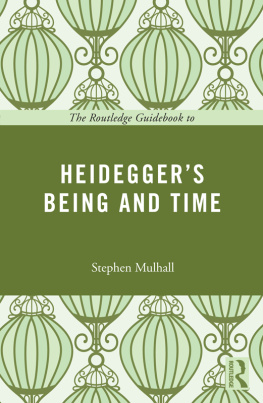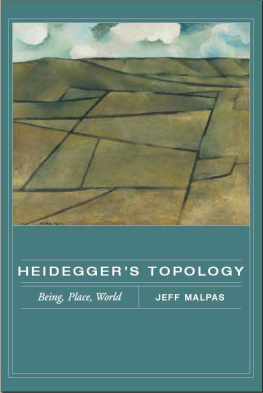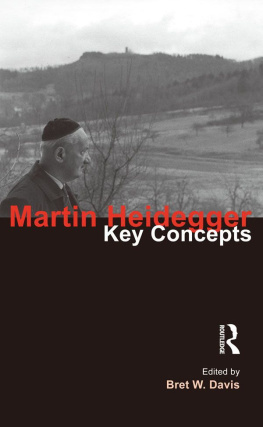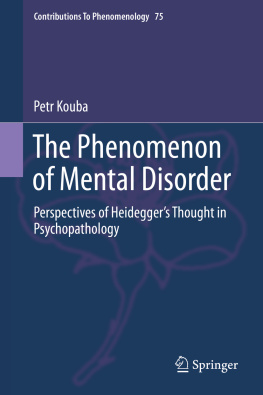Guillaume Payen - Martin Heideggers Changing Destinies : Catholicism, Revolution, Nazism
Here you can read online Guillaume Payen - Martin Heideggers Changing Destinies : Catholicism, Revolution, Nazism full text of the book (entire story) in english for free. Download pdf and epub, get meaning, cover and reviews about this ebook. genre: Religion. Description of the work, (preface) as well as reviews are available. Best literature library LitArk.com created for fans of good reading and offers a wide selection of genres:
Romance novel
Science fiction
Adventure
Detective
Science
History
Home and family
Prose
Art
Politics
Computer
Non-fiction
Religion
Business
Children
Humor
Choose a favorite category and find really read worthwhile books. Enjoy immersion in the world of imagination, feel the emotions of the characters or learn something new for yourself, make an fascinating discovery.
- Book:Martin Heideggers Changing Destinies : Catholicism, Revolution, Nazism
- Author:
- Genre:
- Rating:4 / 5
- Favourites:Add to favourites
- Your mark:
- 80
- 1
- 2
- 3
- 4
- 5
Martin Heideggers Changing Destinies : Catholicism, Revolution, Nazism: summary, description and annotation
We offer to read an annotation, description, summary or preface (depends on what the author of the book "Martin Heideggers Changing Destinies : Catholicism, Revolution, Nazism" wrote himself). If you haven't found the necessary information about the book — write in the comments, we will try to find it.
Guillaume Payen: author's other books
Who wrote Martin Heideggers Changing Destinies : Catholicism, Revolution, Nazism? Find out the surname, the name of the author of the book and a list of all author's works by series.
Martin Heideggers Changing Destinies : Catholicism, Revolution, Nazism — read online for free the complete book (whole text) full work
Below is the text of the book, divided by pages. System saving the place of the last page read, allows you to conveniently read the book "Martin Heideggers Changing Destinies : Catholicism, Revolution, Nazism" online for free, without having to search again every time where you left off. Put a bookmark, and you can go to the page where you finished reading at any time.
Font size:
Interval:
Bookmark:
M ARTIN H EIDEGGERS C HANGING D ESTINIES

Published with support from the Fund established in memory of Oliver Baty Cunningham, a distinguished graduate of the Class of 1917, Yale College, Captain, 15th United States Field Artillery, born in Chicago September 17, 1894, and killed while on active duty near Thiaucourt, France, September 17, 1918, the twenty-fourth anniversary of his birth.
Originally published in France as Martin Heidegger: Catholicisme, rvolution, nazisme. PERRIN, un dpartement dEdi8, 2016.
The Publisher shall be the exclusive owner of the copyright and all rights in translation.
English translation copyright 2023 by Yale University.
All rights reserved.
This book may not be reproduced, in whole or in part, including illustrations, in any form (beyond that copying permitted by Sections 107 and 108 of the U.S. Copyright Law and except by reviewers for the public press), without written permission from the publishers.
Yale University Press books may be purchased in quantity for educational, business, or promotional use. For information, please e-mail (U.K. office).
Set in Scala type by IDS Infotech Ltd.
Printed in the United States of America.
Library of Congress Control Number: 2021952942
ISBN 978-0-300-22832-8 (hardcover : alk. paper)
A catalogue record for this book is available from the British Library.
This paper meets the requirements of ANSI/NISO Z39.48-1992 (Permanence of Paper).
10 9 8 7 6 5 4 3 2 1
This American edition
in memoriam
Jane Marie Todd
Uxori filiisque dulcissimis
C ONTENTS
An Albatross Tries Out the Goose Step (19331934)
Conclusion
A translator, according to the etymology of the word, is one who carries over; she bundles up what is expressed in one language and escorts it across the language barrier. Translators know that this barrier is not a wall to be scaled, disembodied meanings in tow, but rather an infinite number of fissures between and even within words. Sometimes we are given the opportunity to explore minutely these cracks and crevices. In Martin Heideggers Changing Destinies, at least three languages are in play: the German in which Heidegger wrote his texts and the ambient language he absorbed over a lifetime, including the discourse of Nazism; French, the language of Guillaume Payens biography; and the translators own Englishwith occasional excursions into ancient Greek and Latin.
What became evident as we were preparing this translation is that a number of terms that slip seamlessly from Heideggers German into Payens French pose challenges when the attempt is made to translate them into English. Nowhere is this clearer than with the adjective geistig, which Payen most often renders as spirituel. The German noun Geist, like the French esprit, means both spirit and mind; the adjective can thus signify spiritual and also intellectual. It is important to realize that these are not two separate meanings: in French, the spirituel stands in opposition to the matriel, the material, and thus encompasses both things of the mind and things divine. In English, however, we use two different words for these two aspects of the spirituel. In short, spiritual occupies a narrower semantic field than either geistig or spirituel.
The spirituel is one of the through-lines of the three destinies (Catholicism, revolution, and Nazism) that Payen traces in Heideggers life. As a young Catholic and aspiring priest, Martin Heidegger focused his attention on the divine. When he lost his faith and turned to secular philosophy, his interest turned to the intellectual. And when he embraced Nazism, he did so as an oracle for the spirit, the Geist, of the German people, who, he believed, had a special role to play in the unfolding of history and philosophyof the history of philosophy as history in general. The various inflections of Geist and the geistig were not merely consecutive in Heideggers life: they also overlapped. Even as a priest in training, he was interested in the destiny of his people; and his religious background and training informed his notion of himself and his philosophy even after he had lost his faith.
As translators, we believed it was important to capture that continuity, even at the cost of stretching the usual sense of spiritual and spirit. We use these terms whenever possible, even when the more obvious renderings would be intellectual and mind. For example, in a letter of 8 September 1920, Heidegger writes to his wife that sometimes one could really almost become a geistiger Antisemit. We retain the choice made by R. D. V. Glasgow, the translator of these letters into English, of spiritual anti-Semite, even though the French translation that Payen cites, and subsequently adopts in his discussion, renders the expression as antismite de lintelligence (we do note parenthetically the alternative sense of intellectual), a strange expression that Payen goes on to gloss. In this way, we allow the term spiritual to resonate with its earlier meaningsassociated with Heideggers religious childhood and his dialogue with Thomas Aquinas and Augustineand with those it later takes on in the Nazi period.
A number of other terms also occupy semantic fields that correspond in German and French but not in English.
Kampf (combat in French) we translate variously as battle, combat, and struggle (in the context of Heideggers discussion of the Heraclitean term polemos). For English-language speakers, the best-known and most notorious use of this term is in the title of Adolf Hitlers Mein Kampf, which the French know as Mon combat.Kampf becomes an important philosophical term in Heideggers Being and Time (1927). Payen traces the notion back to the philosophers experience as a young man working at a meteorological station during the First World War, hence to the specific context of battle or combat. In Heideggers philosophy, Kampf comes to designate a more general attitude, Daseins relation to freedom, time, and death. Payens interest in the interactions between the biographical, the more broadly historical, and the philosophical is encapsulated in this tracing of the term Kampf/combat in Heideggers philosophical texts and in German culture generally. Readers should therefore be alert to the German term lurking behind the various English words.
Boden (sol in French) we render as ground or soil. The term can signify a philosophical ground or foundation, but it also designates the native soil, as in the Nazi ideology of Blut und Boden, blood and soil. It appears in the compounds Bodenlosenkeit (absence du sol, groundlessness) and Bodenstndigkeit (assise sur un sol vritable, groundedness or ground to stand on). A bodenstndige Kultur is a culture rooted in the soil. Payen explores the intertwined meanings of Boden/sol, which, once again, the English language separates into two words.
The term Boden is associated with the Heimat (native region, little homeland, or simply home) and with two other Heideggerian expressions: Verwurzelung (enracinement, rootedness) and Entwurzelung (dracinement). We usually translate dracinement as uprootedness, though it should be kept in mind that, in the context of anti-Semitism, the more common usage in English is rootlessness, as in rootless cosmopolitans. When the English-language translations of Heidegger use different terms for these notions, we only infrequently modify them.
Next pageFont size:
Interval:
Bookmark:
Similar books «Martin Heideggers Changing Destinies : Catholicism, Revolution, Nazism»
Look at similar books to Martin Heideggers Changing Destinies : Catholicism, Revolution, Nazism. We have selected literature similar in name and meaning in the hope of providing readers with more options to find new, interesting, not yet read works.
Discussion, reviews of the book Martin Heideggers Changing Destinies : Catholicism, Revolution, Nazism and just readers' own opinions. Leave your comments, write what you think about the work, its meaning or the main characters. Specify what exactly you liked and what you didn't like, and why you think so.

